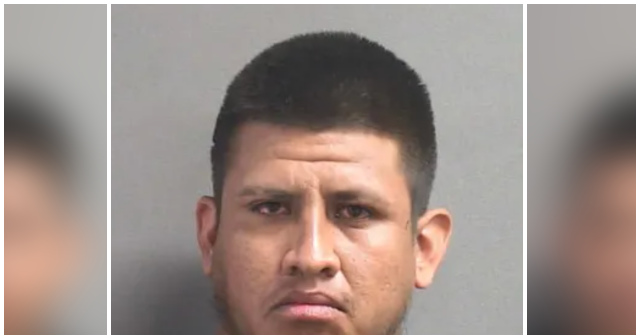In a harrowing incident in Volusia County, Florida, police responded to a potentially life-threatening situation when a woman was facing an attempted rape by 27-year-old Luis Diego Hernandez-Moncayo, who is reported to be an illegal alien. The encounter took place early in the morning in a field in Pierson, where the woman, in a clever act of bravery, managed to call 911 while disguising the nature of her distress by pretending to order a pizza. This quick thinking allowed her to signal to law enforcement that she was in immediate danger without alerting her assaulter.
When deputies arrived at the scene after tracking the woman’s location through her 911 call, they discovered Hernandez-Moncayo on top of her as she was desperately shouting for help. The gravity of the situation was evident in the police bodycam footage, which captured her cries of “He’s trying to rape me!” As deputies intervened, the victim expressed her relief, thanking the responders for their timely arrival amidst the traumatic episode she was experiencing.
Hernandez-Moncayo has since been arrested and faces serious charges, including attempted sexual battery, battery by strangulation, and false imprisonment. According to reports, he had applied for asylum in the United States just a day prior to his arrest, raising questions about his legal status in the country. Following his detention, U.S. Immigration and Customs Enforcement (ICE) placed a detainer on him, indicating their intention to seek custody in relation to his immigration status and the accusations against him.
Sheriff Mike Chitwood of Volusia County commended both the law enforcement response and the victim’s resourcefulness during the incident. He highlighted the effectiveness of her decision to call for help in a manner that would not alarm her attacker, which ultimately contributed to her rescue. The sheriff’s sentiments emphasize the importance of quick thinking in critical situations and the role it plays in ensuring personal safety.
The incident reflects broader issues surrounding immigration and public safety in the United States, particularly regarding individuals who have entered the country illegally and are accused of committing serious crimes. Hernandez-Moncayo’s case illustrates the complexities of the asylum application process, especially when it intersects with criminal charges. The community is left grappling with the implications of such events, fostering discussions around immigration policies and the protection of vulnerable individuals.
In the aftermath of this alarming situation, the community in Volusia County is reminded of the necessity for vigilance and awareness of one’s surroundings. The victim’s ability to seek help is a powerful testament to the strength individuals can display even in dire circumstances. As Hernandez-Moncayo awaits consequences for his actions, the incident serves as a poignant reminder of the necessity for effective law enforcement response and the importance of supporting individuals who find themselves in threatening situations.

